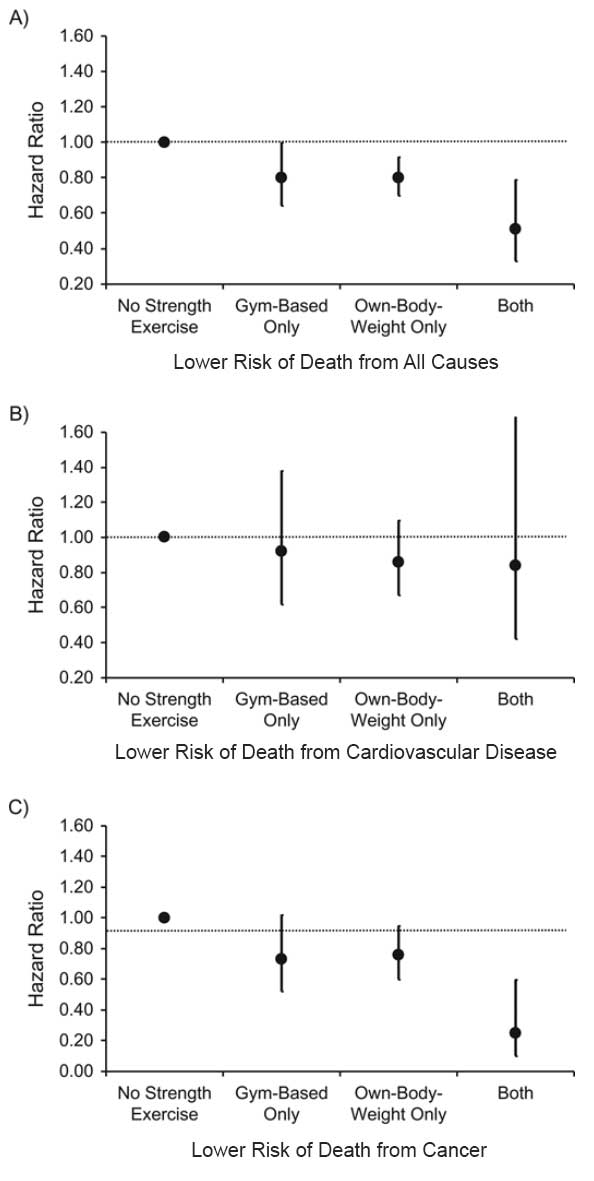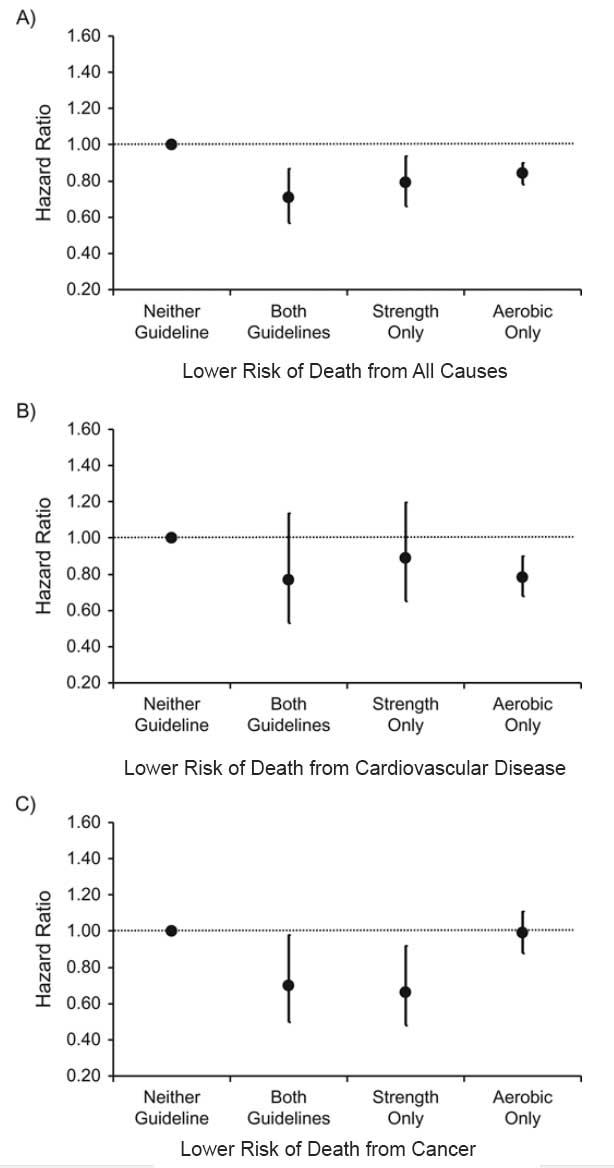
There has been ample proof that exercise can lower blood pressure and bad cholesterol levels. It reduces your risk of heart disease and diabetes. There are dozens of other benefits too, so it shouldn’t be too hard to believe it can also reduce your risk of cancer should it?
Now there are studies that prove exercise reduces cancer risk. Resistance training, or what is also known as weight-bearing exercise, is specifically the type of exercise that has the most positive effect on preventing cancer.
Resistance Training Lowers Risk of Cancer
A research study by The University of Sydney School of Public Health of over 80,000 participants determined that there is a “well-established association between participation in regular physical activity and reductions in all-cause, cardiovascular disease, diabetes, and cancer-related mortality.” (1)
The study took a detailed look at cardio and strength/resistance training and compared mortality rates caused by the various diseases mentioned. The results clearly showed that weight bearing exercise lowered participant’s risk of developing cancer.
The good news is that you don’t even need to go to the gym or become a body builder to get your resistance training exercise. There is no need to pay a monthly fee, travel anywhere to workout, or put yourself in an uncomfortable environment to reduce risk of cancer and extend your life.
As shown in the graphic below, just using your own body weight for exercises like pull-ups, push-ups, planks and sit-ups were just as effective as gym-based exercises. However, for the participants who did both, the results were even better for overall mortality.

The above discussion was just about strength or resistance training. So what about cardio exercise?
Cardio was shown to be better in reducing death caused by cardiovascular disease; however strength training was far better at reducing death by cancer as shown in the graphic below

The overall takeaway from this study is that if you want to reduce your chances of dying from cardiovascular disease or cancer, you need both aerobic and resistance training. Resistance or strength training is the winner as far as preventing cancer goes.
Yet another almost 19-year study, found similar results. The Cancer Epidemiology, Biomarkers & Prevention study included over 8,000 men and examined the associations between muscular strength and cancer mortality rate in men. (2)
This study too found that higher levels of muscular strength are associated with lower cancer mortality risk in men. The following chart shows that the results are pretty obvious.

Exercise for People Who Already Have Cancer
Research reported in Epidemiologic Reviews came to the conclusion that exercise also has positive effects on those who have already been diagnosed with cancer. (3)
The researchers extracted data from over 5000 articles about previous cancer studies. The purpose of this study was to evaluate the impact of exercise on cancer mortality and cancer re-occurrence following a cancer diagnosis.
Results of this research showed that those who exercised regularly during their cancer treatment had improvements in treatment related symptoms, better bone health, improved sexual health, improved cognitive health, improved bowel and bladder function, less fatigue, less psycho-social distress, improved sleep, and overall quality of life.
These results should not be surprising since exercise produces all of those benefits for anyone who does it regardless of their current level of health.
The findings of this research are for both cardio and resistance training and did not specifically isolate either one. Both were identified as important and the evidence is strong for people with cancer to avoid inactivity and instead engage in regular exercise.
The evidence is now convincing enough to say that exercise is an important adjunct therapy in the management of cancer. This review study confirms that “patients involved in greater levels of exercise have lower relative risk of cancer mortality, lower risk of cancer recurrence, and they experience fewer and/or less severe treatment-related adverse effects.”

When you factor in what the American Journal of Epidemiology study above found about resistance training preventing cancer, the recommendation is clearly to include weight-bearing exercise in your weekly routine.
A small study at the Osaka University in Japan also found that participants with “sarcopenia” weren’t able to fight off tumor growth of their lung cancer as well as those without. (4)
Sarcopenia sounds like some scary disease but it is the natural loss of muscle tissue that is part of the aging process after you reach 40 years old. If you’re not doing weight-bearing exercise of some sort and you are over 40, then you have sarcopenia.
To summarize the Japanese study, they found that treatments for those patients with sarcopenia were far less effective than on those who did not have it.
So if you previously considered weight lifting to be something only body-builders did to bulk up, it’s time to start thinking about it as more of an insurance plan against future health issues.
Conclusion
The late fitness guru Dr. Kenneth Cooper once said: "You don’t stop exercising because you grow old. You grow old because you stop exercising." Unfortunately if you don’t exercise, according to the research above you’ll be less likely to get the opportunity to grow old.
Just as it has been proven that resistance training has all sorts of positive health benefits, it has now been proven that cancer prevention is another one of those benefits. That’s just one more reason for you to start doing some sort of weight-bearing exercise today. The exercise you chose can be as simple as doing body-weight-bearing exercises or even getting a set of resistance bands to do basic exercises. The type of resistance training is your choice but you first have to choose to make it part of your weekly routine.
Research:
- Does Strength-Promoting Exercise Confer Unique Health Benefits? A Pooled Analysis of Data on 11 Population Cohorts With All-Cause, Cancer, and Cardiovascular Mortality Endpoints: American Journal of Epidemiology, Volume 187, Issue 5, May 2018, Pages 1102–1112, https://doi.org/10.1093/aje/kwx345
- Muscular strength and adiposity as predictors of adulthood cancer mortality in men: Cancer Epidemiol Biomarkers Prev. 2009 May; 18(5): 1468–1476, http://cebp.aacrjournals.org/content/18/5/1468.long
- The Impact of Exercise on Cancer Mortality, Recurrence, and Treatment-Related Adverse Effects: Epidemiologic Reviews, Volume 39, Issue 1, January 2017, Pages 71–92, https://academic.oup.com/epirev/article/39/1/71/3760392
- Impact of sarcopenia in patients with advanced non–small cell lung cancer treated with PD-1 inhibitors: A preliminary retrospective study: Scientific Reports 9, Article number: 2447 (2019), https://www.nature.com/articles/s41598-019-39120-6

Tim Bruxvoort is founder of FitManPlan.com whose mission it is to help men over 40 live the best version of their lives through fitness, nutrition, pain management, and improved life skills. He is a long-time, aging entrepreneur and health enthusiast who has experienced many of the challenges currently being faced by other men over 40 and his goal is to deliver solutions to help them achieve their fitness and health goals.
